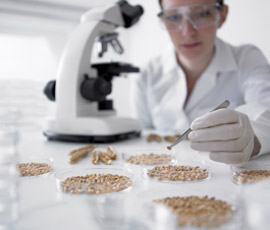Government unveils £160m ‘agri-tech’ strategy

The government has unveiled a £160m strategy to boost farming technology – a move it says will turn the UK into a world leader in agricultural science.
It aims to help farmers to deliver sustainable, healthy and affordable food for future generations.
The strategy includes a £160m government investment in developing cutting edge technologies and taking innovative products such as cancer-fighting broccoli from the field to the shopping aisle.
Industry is also expected to invest heavily in the project, with the aim to transform farming in the UK, using the latest technologies to produce more while affecting the environment less.
With the demand for food rising rapidly worldwide, the strategy also aims to make the UK a world leader in addressing global food security issues.
Agri-tech is a well-established and important UK sector. The entire agri-food supply chain, from agriculture to final retailing and catering, is estimated to contribute £96bn to the economy and employ 3.8 million people.
The Agricultural Technologies Strategy is being launched at the East Malling Research centre in Kent on Monday (22 July).
Science minister David Willetts said: “We have a world-class science and research community and our institutes and universities are at the forefront of agricultural research.
“To get ahead in the global race, this strategy sets out how we can ensure we turn our world-beating agricultural science and research into world-beating products and services.”
The agri-tech strategy follows recent similar plans for the automotive, construction and aerospace sectors to secure sustainable future growth in the economy.
DEFRA minister for science Lord De Mauley said: “We face a global challenge to feed the rapidly increasing population in a way that is affordable and sustainable.
“We are investing in technologies that will enable British farmers to meet these challenges and take advantage of the growing demand in export markets for British food.”
The strategy includes £30m for four agri-science research and innovation campuses set up by the Biotechnolocy and Biological Sciences Research Council
There will also be a multimillion pound scientific research partnership between Rothamsted and Syngenta to increase wheat productivity
A new leadership council will bring together representatives from the diverse agriculture sector, including food and farming production, industry, science and research and government.
NFU president Peter Kendall said the strategy could lead to a step-change in the efficiency, profitability and resilience of UK farm businesses.
It was significant that agricultural science and technology were finally being recognised right across government as essential to the success of the farming industry.
Mr Kendall said: “The strategy resonates strongly with existing developments and initiatives involving many food, farming and research organisations and will catalyse lots of further activity.
“Skills and training for farmers are absolutely critical so that knowledge generated through agri-science can be adopted at a commercial scale.
“It is essential that the science is translated into activity and behaviour change on farm.
“Showing agriculture as an innovative, rewarding and business-focused sector will make it a career of choice for the next generation of farmers, advisers, engineers, vets and scientists.”
